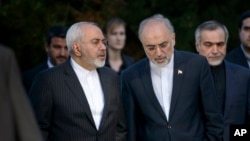Senior diplomats from several of the so-called P5+1 nations dealing with Iran's controversial nuclear ambitions are arriving in Lausanne Saturday where U.S. Secretary of State John Kerry and Iranian Foreign Minister Mohammad Javad Zarif have been meeting for talks aimed at reaching a framework deal by Tuesday's deadline. But it is not clear when talks would end or how specific any agreement would be.
The March 31 date was set after two previous deadlines were missed, and officials have said a further extension is not likely. But they also have noted that Tuesday is the deadline for reaching a “political agreement” on the major elements of an accord. Up to three more months of negotiations can be used to finalize the details and draft a document.
The deadline "appeared to be very important, but as we’re getting closer, we’re seeing some contradictory signals,” said Iran analyst Trita Parsi.
The talks in Lausanne could go beyond midnight Tuesday, he said, particularly because the U.S. Congress is in recess and opponents of the talks won’t be able to impose more sanctions on Iran until mid-April.
"This deadline, from the outset, was only supposed to be a milestone in a larger journey," Parsi said. "The real deadline is the June deadline, when the final deal is supposed to be announced.”
Content, not timing
Iranian officials have indicated they never liked the two-deadline plan and are more focused on the final accord. France has also urged its colleagues in the P5+1 negotiating team — the U.S., Britain, Russia, China and Germany — not to rush to a deal by Tuesday, saying the content is more important than the timing.
A senior U.S. official told reporters that the delegation could “see a path forward” to reach what he called “a political framework that addresses all of the major elements of a comprehensive deal” before the deadline.
Such a deal would set limits on Iran’s nuclear program to ensure it does not develop a nuclear weapon, which its leaders say they do not want to do. The agreement would provide for extensive inspections of nuclear plants and related facilities to ensure compliance. And it would set a schedule of relief from international economic sanctions that have crippled Iran’s economy.
But even if the negotiators reach the basic accord in the coming days, Kelsey Davenport of the Arms Control Association is not sure what form it will take.
"It is unclear right now what exactly Iran and the P5+1 might release at the end of March, if they reach an agreement," Davenport said. "But even reaching a broad agreement will allow the Obama administration to go to Congress to show that Iran is not playing for time, that they’re interested in a deal and U.S. policy goals are generally being met.”
Deal by Sunday?
There are reports that officials want to reach their agreement well before the deadline, perhaps by Sunday night. Kerry reportedly would like to attend an event in the United States on Monday, and some of his European counterparts are expected here in time to endorse a deal over the weekend.
But after the two sides reached only a partial agreement a year and a half ago, and missed two deadlines last year, seasoned observers are skeptical, including Parsi.
“Both sides are going to hold off with their major concessions until the last moment," he said. "That’s exactly the way it went down in November 2013. They went two days over the deadline, and they were negotiating until the very last moment.”
So the talks could end at any moment, or could go a few hours or days past the deadline. And if there is an agreement, it could be a fairly detailed document or just a page or two of relatively general statements. No one seems to know.
If anyone inside the negotiating rooms does know, he isn't talking, as has been the practice throughout this process.




